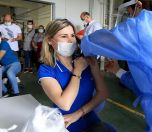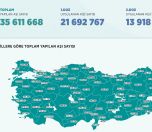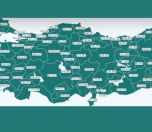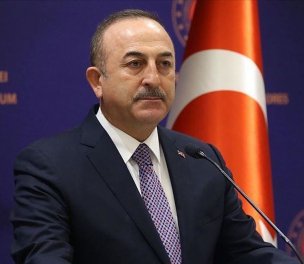Photo: AA/File
Click to read the article in Turkish
The Turkish Medical Association (TTB) has called on the government to take action to eliminate Covid-19 vaccine hesitancy and inequality.
The Ministry of Health should stop requesting consent forms from people to be jabbed, which increases hesitancy, the association said in its weekly bulletin yesterday (June 16).
"Receiving 'written contracts' from people under the name of 'informed consent' for the service of vaccination, which is a public responsibility, should be abandoned immediately," said the TTB. "All health consequences of vaccination should remain under the responsibility of the state as a requirement of the public health service."
"To prevent vaccine hesitancy and encourage people for vaccination, the Ministry of Health should urgently start a communication campaign and all the process should be run transparently," it said.
According to an April survey led by Prof. Veysel Bozkurt, a member of the ministry's Social Science Board, more than 25 percent of adults are either against or hesitant about receiving the vaccine.
The Ministry of Health has set up "vaccine persuasion teams," which visit people at their homes to inform them about vaccines.
Having struggled to procure enough vaccine doses for months, Turkey was able to administer more than two million jabs in the past couple of days.
Some 37.4 million have been vaccinated so far with 14 million people receiving two doses, according to the Ministry of Health's tracker. The country's adult population is about 61 million.
Delta variant
The TTB warned of the Delta variant, which is thought to be more resilient to vaccines.
"... Considering the recent increase in the cases in England, which is successful in vaccination, viral genome sequencing studies should be started for the variants," it said.
The TTB also made the following recommendations:
• All the population over 18 residing in Turkey should be eligible for vaccination rather than vaccination by "priority groups."
• Considering the extent of precarious work and that all insecure people are in vulnerable groups, there should be no difference between people who are covered by the Social Security Institution and those who are not.
• Special efforts should be made for the vaccination of workers who work in closed and crowded environments, seasonal agricultural workers, people living in rural areas with limited access to hospitals, those who live in prisons, LGBTI+s, homeless people and all vulnerable groups.
• After all the adult population receives at least one vaccine dose, people over the age of 65 and health care workers should be given the third dose in the light of obtained scientific data.
• Data on vaccination should be shared in accordance with scientific standards. It is necessary to announce vaccination rates according to parameters such as age, profession, residence and the reality of vaccine hesitancy should be addressed. (AÖ/VK)












